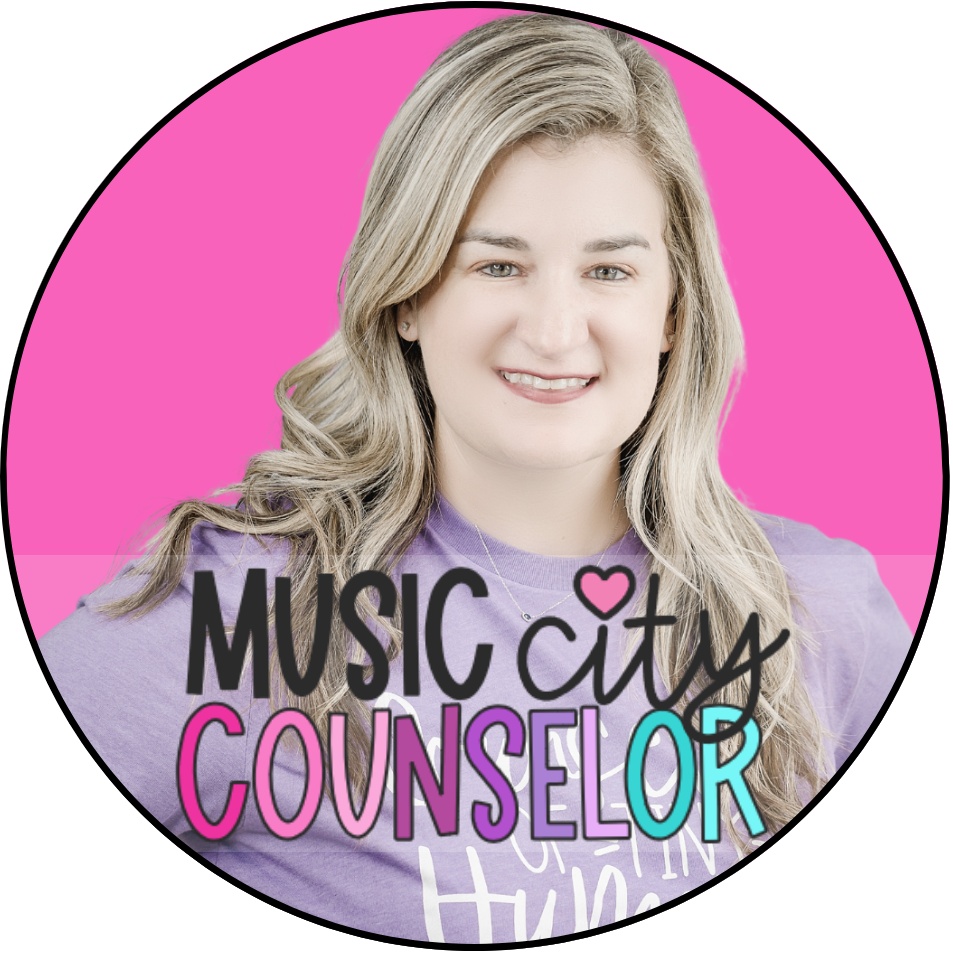
Hey y’all! Thanks so much for stopping by. My name is Laura and I am an Elementary School Counselor turned Curriculum Writer. At my precious school in Nashville, TN, 97% of my students were living in …
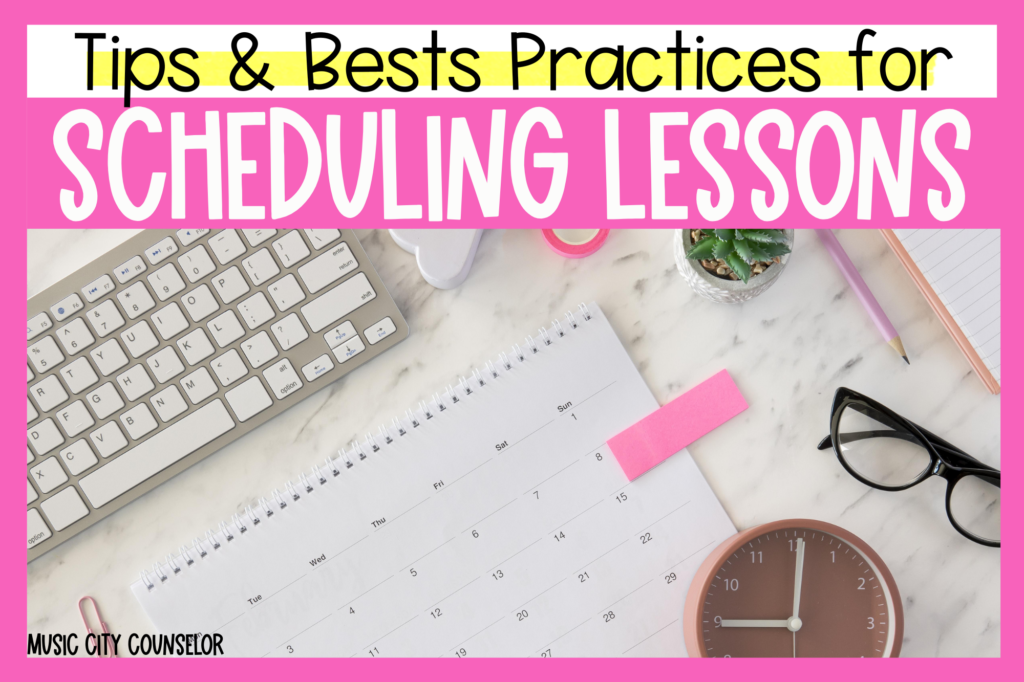
One of the most common questions that school counselors ask me is: “How do you schedule classroom guidance lessons?”
It sounds like a simple question that deserves a simple answer, but the truth is, scheduling counseling lessons can be a headache! School counselors may feel overwhelmed by so many “moving parts,” and unsure where to start.
In this blog post, I’ll share my best tips for success for scheduling counseling lessons, so that you can confidently create your monthly calendar and provide the high-quality Tier 1 services that your students need and deserve!
Before we get started with building your counseling lesson calendar, I’d like you to please consider these important questions:
Let’s also keep in mind that, while some school counselors have the freedom, resources, and time to design their calendar and program as they best see fit…others, unfortunately, do not. State, district, school, or administrator mandates, and inappropriate duties, may limit the school counselors’ ability to provide the critical services that their students need. If you can relate to this, don’t worry, you are not alone! I would encourage you to read my blog post that teaches my four-step process for advocating for appropriate duties for the role of the school counselor.
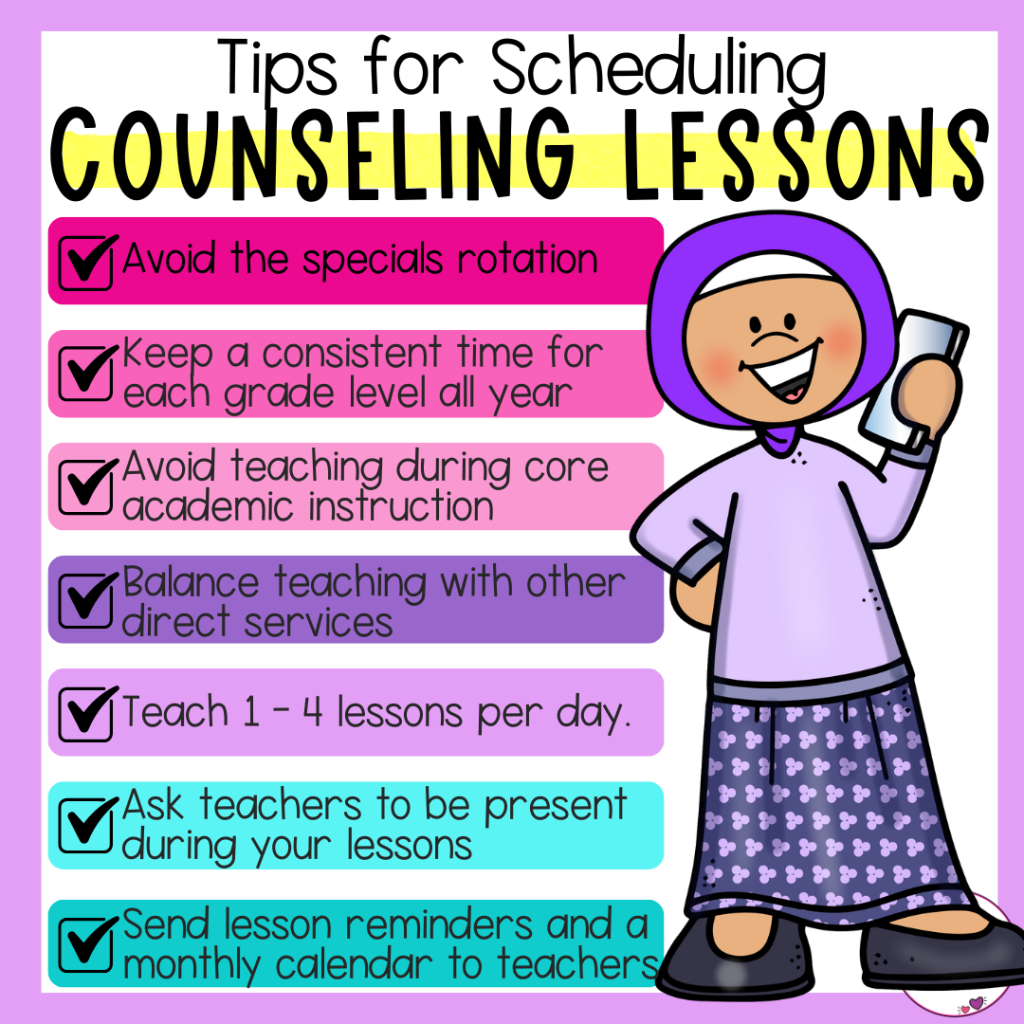
Now, I’d love to share with you my best tips for scheduling counseling lessons. Let’s not forget that the role of the school counselor, and the way school buildings are run, vary drastically from state to state, district to district, and even school to school within the same district! So, what has worked best for me, may not work best for you. And that’s totally okay! My hope is that this post offers you systems, routines, organizational strategies, and ideas that you can implement at your school, and alter as needed!
The role of the school counselor is all about balance. Although counseling lessons are a critical Tier 1, preventative, direct service, it is crucial that we not spend TOO much time in the classroom. When school counselors’ schedules are dominated by classroom lessons, other services such as small group counseling, individual counseling, crisis intervention, consultation and collaboration, etc. tend to fall by the wayside.
As a school counselor who has been in the related arts rotation before, I strongly recommend avoiding it at all costs. When I was part of our specials rotation, I taught an average of 4-6 45-minute classroom lessons each day, and students literally referred to me as their “guidance teacher.” I felt so defeated and misunderstood! My students and teachers desperately needed more from me, but the time spent in the classroom, and planning for all of these lessons, made it near impossible to provide the comprehensive school counseling program that my students deserved.
I ended up leaving this position for a school closer to home that, after some advocacy work, allowed me to create my own classroom lesson schedule. This was a total game-changer for me (and my students!), and I finally felt like a school counselor rather than a related arts teacher!
Once I had the freedom to create my own lesson schedule and design my program to best meet my student needs, I was thrilled! Until I realized…wait, how do I do this? Where do I start? To save you some of this headache, I’ll share the processes and procedures that were most helpful to me.
At the beginning of each school year at teacher in-service, I asked each grade level to choose a time for their counseling lessons. I made sure that each grade level chose a different time of day, and that their time was not during core academic time (English Language Arts or Math). I found the most success with 30 minute lessons twice/month with K – 1st grades, and a 45 minute lesson once/month with 2nd – 4th grades. To keep things simple and consistent, we stuck to this same lesson time the whole school year for each grade level. For example, Kindergarten may be from 9:00 – 9:30 AM , and 4th grade may be from 2:00 – 2:45 PM all school year.
After each grade level chose their designated lesson time, I filled out the “Lesson Scheduling” document below. I typed in my teacher names, grade levels, and lesson times. I laminated it and taped it to my desk so that I could easily reference it each time I created my lesson schedule for the month.

Next, it was time to plug away and schedule my lessons! In my experience, the “magic” number was to teach anywhere from 1 to 3 counseling lessons each day. This was my perfect balance of providing high-quality lessons to all students, while still having enough time and energy for Tier 2 and Tier 3 services (and lesson planning, too!).
I tried to keep the day of the week consistent for each class (if possible!) so that the teacher could more easily remember their lesson. I taught each class in a grade level on back-to-back days so that the material was fresh for me and the resources were ready to go. For example, I had 5 Kindergarten classes, so I taught them for 5 days in a row from 9:00 – 9:30 AM. You can check out a sample monthly lesson calendar below (the grade levels, teacher names, and lesson times match the “Lesson Scheduling” document above).
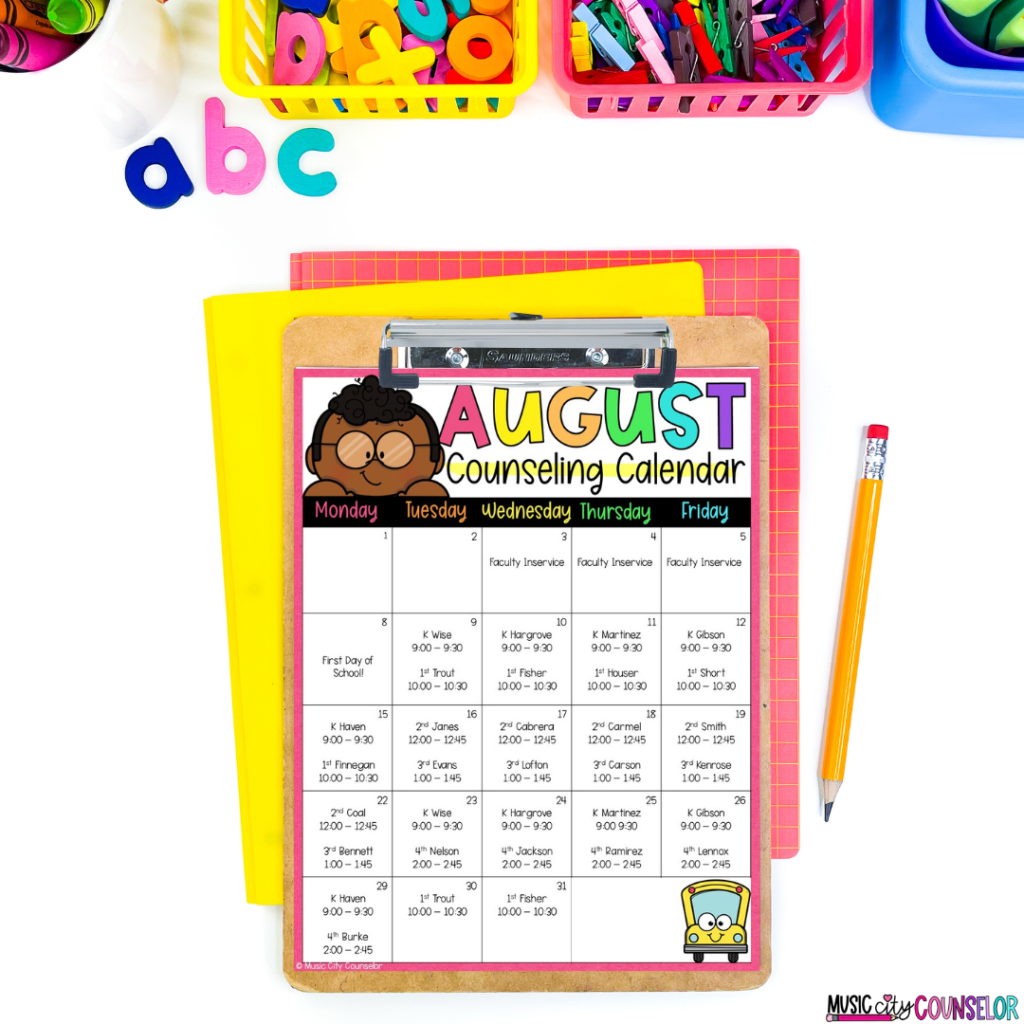
This tip may seem a little strange and unexpected at first, but asking classroom teachers to observe and be part of our counseling lessons has enormous benefits! Just like reading and math, students need repetition and practice to learn social-emotional skills. When classroom teachers are present for counseling lessons, they can reinforce the material that we taught in their classrooms. For example, if my lesson topic for the month is friendship, the classroom teacher could use their morning meeting time to build and practice these skills with their students. Also, if a topic is highly sensitive such as personal safety or child abuse prevention, I really like classroom teachers to be present just in case a student discloses abuse or reacts to the material in a way that needs special support or attention.
If teachers are not able to stay for counseling lessons due to scheduling or other restraints, I highly recommend that school counselors share the lesson materials with them via email or a short handout. Giving teachers a summary of what was taught, story book recommendations, and other ways that they can reinforce the material will help your students continue to grow their skills (and also offer an excellent way for you to collaborate and partner with teachers!)
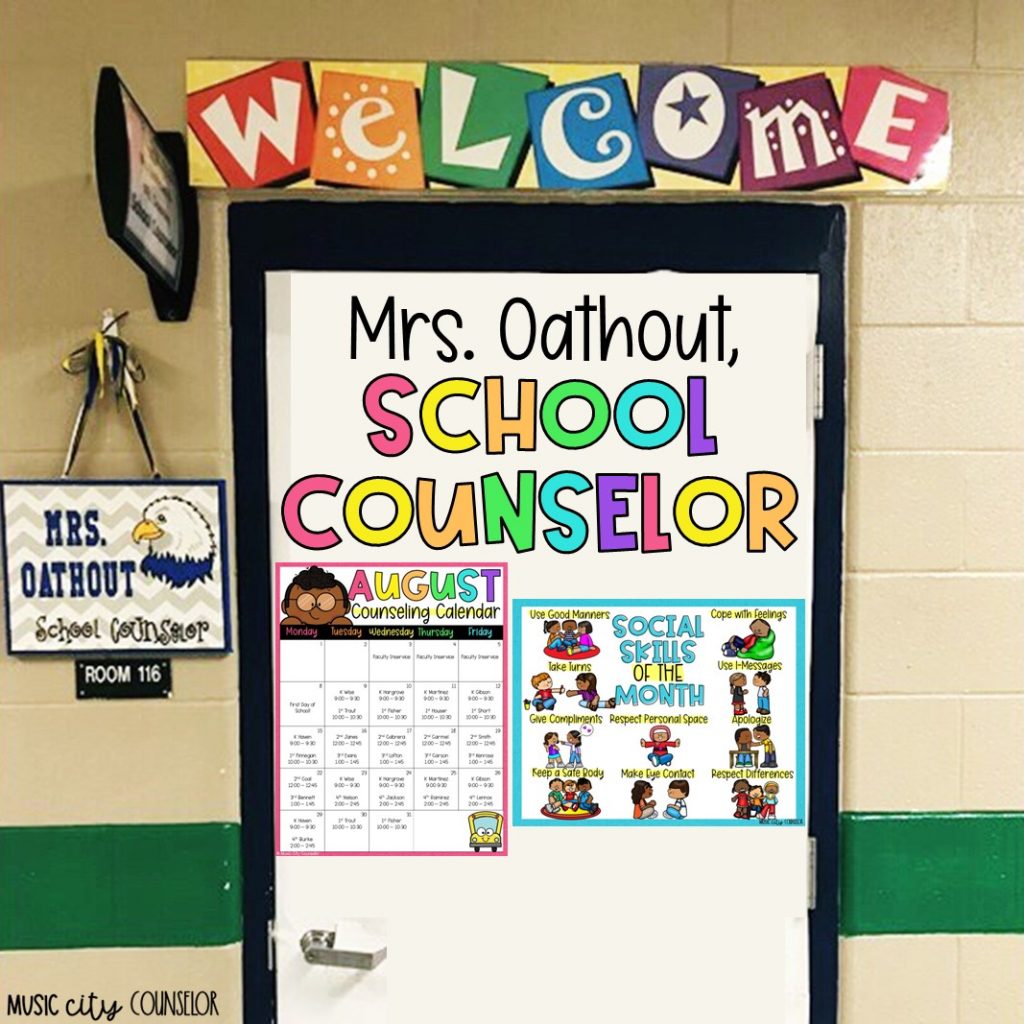
My last tip for you is to use multiple different methods, both digital and printable, to remind your classroom teachers of their counseling lesson time. We all know how it feels when a teacher forgets our lesson, or we show up to teach and the teacher was not expecting us (womp womp)!
Here are strategies that helped me communicate my schedule to teachers:
I hope that this blog post offered you practical tips and advice for how to schedule your counseling lessons, and left you feeling confident enough to get started!
What are your best strategies and systems for scheduling lessons? Please comment below, I’d love to hear from you!

| Cookie | Duration | Description |
|---|---|---|
| cookielawinfo-checkbox-analytics | 11 months | This cookie is set by GDPR Cookie Consent plugin. The cookie is used to store the user consent for the cookies in the category "Analytics". |
| cookielawinfo-checkbox-functional | 11 months | The cookie is set by GDPR cookie consent to record the user consent for the cookies in the category "Functional". |
| cookielawinfo-checkbox-necessary | 11 months | This cookie is set by GDPR Cookie Consent plugin. The cookies is used to store the user consent for the cookies in the category "Necessary". |
| cookielawinfo-checkbox-others | 11 months | This cookie is set by GDPR Cookie Consent plugin. The cookie is used to store the user consent for the cookies in the category "Other. |
| cookielawinfo-checkbox-performance | 11 months | This cookie is set by GDPR Cookie Consent plugin. The cookie is used to store the user consent for the cookies in the category "Performance". |
| viewed_cookie_policy | 11 months | The cookie is set by the GDPR Cookie Consent plugin and is used to store whether or not user has consented to the use of cookies. It does not store any personal data. |